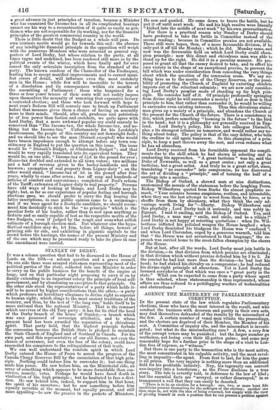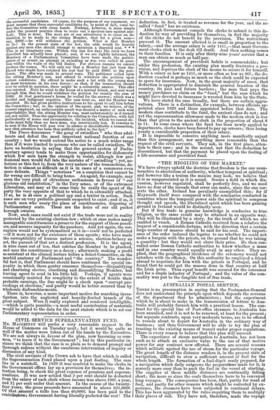AGENCY DIE MASTER-KEY OF PARLIAMENTARY CORRUPTION.
IN the present state of the law which regulates Parliamentary elections, those who have the most interest in the result, and who conduct the business with decorum and purity in their own acts, may find themselves defrauded of the results by the misconduct of the few. A certain number of venal men vitiate the proceedings, and the electors are deprived of their Member, the Member of his seat. A Committee of inquiry sits, and the misconduct is investi- gated; but what do the misconduoting care A few, a very few of the corrupt voters may be punished ; but the larger number go scatheless, not losing even their ill-gotten gains; and some may reasonably hope for a further prize in the shape of a visit to Lon- don free of expense, as "witness." But there is one party to the transaction who is the most active, the most concentrated in his culpable activity, and the most revel- ling in impunity—the agent. From first to last, for him the game is all prizes. The very inquiry is nothing more than an additional field for his profitable industry. Nay, his ingenuity can convert non-inquiry into a beneficium ; as the Times discloses in a true story. The tale is covertly told, in deference to the law of libel ; but the essential facts are "arrayed, or rather disarrayed," in so transparent a veil that they can easily be descried. " There is to be an election for a borough : one, two, or more boat fide candidates present themselves for the suffrages of the electors; another one then steps ni, not with the idea of being returned, but simply with the view of placing himself in such a position that he can present a petition against the successful candidates. Of course, for the purposes of our argument, we must assume that these successful candidates do, in point of fact, come be- fore the Committee with clean hands. Nothing, however, is more simple under the present practice than to make out a specious case against any- body. This is done. The next act of our adventurer is to cause an in- timation to be made to the sitting Member, that for a given sum— say, 20001.—he will withdraw the petition. What is that Member to do ? In the present state of the law, the odds would lie heavily against any man who should attempt to maintain a disputed seat. * * * This is no imaginary case. Within this last few days the trick we have described has actually been played ; and, if we are rightly informed, the Members of a Parliamentary Committee have been made the partici- pators of as arrant an attempt at swindling as was ever called in ques- tion within the walls of the Old Bailey. For obvious reasons we cannot produce the names. We will only say that a Member has just been dis- placed who might have retained his seat had he paid 2000/. to the peti- tioner. The offer was made in several ways. The petitioner called upon the sitting Member's son, and offered to withdraw the petition upon certain conditions. He offered to make such a bet with the young man as must terminate in his own favour ; so that, if the transaction should ever be called in question, there might be a colourable answer. This offer was rejected. Next he went to the house of a mutual friend, and sent word through him that he would withdraw the petition for exactly the sum of 20001. At that gentleman's house he waited for the answer ; which was a decided and indignant negative. The case went on, and the Member was unseated. He had given positive instructions to his agent to call him before the Committee ; but, in the opinion of the agent, and, we believe, of the counsel employed, an unfavourable result was deemed a matter of such wild improbability that the sitting Member was, most unfortunately as it turned out, not called. Thus the opportunity for relating to the Committee, with full particularity of name and circumstance, the incident, which we cannot de- scribe more ful4 than we have done, was irretrievably lost. It remains to be seen if the House will pass over in silence so discreditable a transaction, now that attention has been thus publicly called to the fact." The Times denounces "the gang of swindlers" who thus adul- terate and defeat the most important national function of our country ; but we would extend the notice to a much wider range than if it were limited to persons who can be called swindlers. We have no hesitation in saying that the general system of Parlia- mentary agency tends to make those opportunities for dishonesty which few men have the strength to resist, although few pro- fessional men would fall into the mistake of" swindling ": yet, no- torious as this fact is, from the very nature of the transactions, de- tection is almost as difficult as it is in cases of a commerce even more delicate. Things "notorious " on a suspicion that cannot be far wrong are difficult to bring home. An agent, for example, may seem the very pink of chivalrous enthusiasm in favour of "our glorious old constitution," in the Tory sense, or of the extremest Liberalism, and may at the same time be really the agent of the party the very opposite of that to which he is ostensibly attached. If so, he is at once a political spy and a traitor in action. Such cases are on very probable grounds suspected to exist ; and if so, it is such men who usurp the place of constituencies, disposing of Parliamentary seats. These are the heirs of our old pocket borough owners.
Now, such cases could not exist if the trade were not in reality protected by the existing election-law ; which at once makes many manageable constituencies a preserve for the support of these poach- ers, and secures impunity for the poachers. And yet again, the cor- ruption would not be systematized as it is—could not be perfected —if it were not for the existence of these agents ; who have made the corruptibility of human nature a science, election-bribery an art, the pursuit of that art a distinct profession. It is the agent, in nine cases out of ten, that catches the Member to be plucked, and uses the constituency as a decoy ; afterwards making a profit as assistant at the clinical lecture before a Select Committee, on the morbid anatomy of Parliament and "the country." The wonder- ful fact is, that Parliament should have continued the special im- punity in which these gentry ensconce themselves—disqualifying and chastising elector, chastising and disqualifying Member, but leaving agent to send in his little bill. Perhaps, if agents were occasionally mulcted for complicity to the extent of double their probable earnings, the fine might be a cheek upon "corrupt pro- ceedings at elections," and purity would be better secured than by wholesale disfranchiLments.
There is, however, a more important motive for searching inves- tigation into the neglected and heavily-fruited branch of the great subject. Were it really explored and rendered intelligible, —which is quite possible,—a most useful contribution of materials would be added to the data for the next statute which is to set our Parliamentary representation in order.



























 Previous page
Previous page